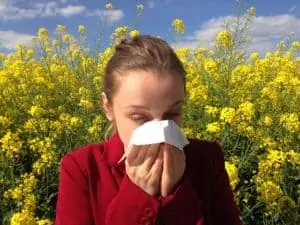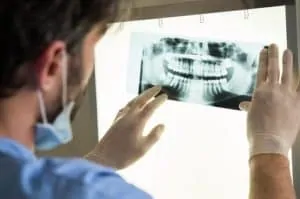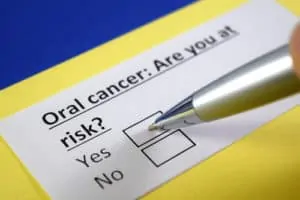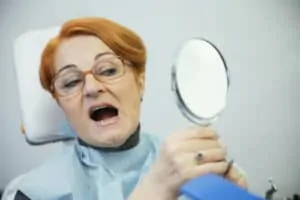Oral Health

Choose the Right Brush
The right toothbrush for you depends on a few factors, including the size of your mouth. Toothbrushes come with various sized heads, so if you have a smaller mouth, choose a brush with smaller brush head. Also make sure the bristles are labeled as soft. Using bristles that are too tough can damage enamel and create problems.
Use Proper Technique
It doesn’t take a lot of elbow grease to thoroughly clean plaque and bacteria off of teeth. In fact, scrubbing too hard can damage teeth. Instead of using a back and forth motion, try to focus in brushing in soft, gentle circles. Don’t forget to hold the toothbrush at a 45 degree angle to get up under the gum line, too.
Replace When Necessary
If your bristles have begun to fray, it’s time to get a new toothbrush. It’s actually overdue for a replacement. When the bristles are nice and tightly fit together they can more easily get in between teeth and under the gums. When they separate, you won’t get as good of a clean.
Commit to Twice a Day
Your dentist in Sparks and the American Dental Association recommend brushing for two minutes, twice day, every day. A thorough cleaning in the morning helps remove plaque and bacteria that have built up overnight, and another two minutes before bed removes food particles and even more bacteria. Not brushing as often as you should may lead to gum disease, which not only affects your oral health, but overall health as well.
Gum Disease & Overall Health
Gum disease is caused by a buildup of bacteria under the gum line. If left untreated it can cause tooth loss and other whole-body concerns including:
- Heart Disease
- Respiratory Problems
- Diabetic Complications
Following the two minute, twice a day guideline and using the right technique goes a long way in keeping your smile in its best shape. But it’s more important than that. Proper oral hygiene can reduce the risk of gum disease and help protect your entire body.
Besides a great at-home routine, maintaining appointments at our Sparks dental office bi-annually will do even more for your health. These regular visits provide a deeper cleaning and remove even more plaque and bacteria buildup. They also give us a way to monitor your oral health for any potential problems so we can treat them early.
If you’re overdue for a dental cleaning, we welcome you to schedule an appointment with us today.

Itchy, Stuffy, and Drippy
Most of us are well aware of the unpleasant symptoms of an allergy flare up. The itchy, watery eyes, the neverending nasal drip, and the sinus stuffiness are all common side effects. And while they’re certainly annoying, they can also affect more than you may think. When your body comes in contact with an allergen, it responds by producing more mucus than normal. This mucus is gross, thick, slimy stuff that blocks airways and sinuses and makes it hard or impossible to breathe out of the nose. Instead, our bodies automatically adapt to breathe from the mouth. This mouth breathing is what’s concerning to your dentist in Sparks.
Why Mouth Breathing is Concerning
Mouth breathing is a bigger problem than it may initially appear. In fact, a study conducted by the Academy of General Dentistry reported that mouth breathing can affect oral health in a variety of ways. Too much mouth breathing as a child can cause a gummy smile or even problems with facial development. And the problems don’t go away in adults either. Mouth breathing has been linked to overall oral health issues, mostly because it causes dry mouth.
Dry Mouth & Oral Health
Dry mouth is an incredibly common complaint in many dental patients, and while it’s certainly uncomfortable, it’s also dangerous. Dry mouth essentially means that saliva production has decreased. And this is a problem. Saliva is responsible for rinsing away bacteria and neutralizing acids in the mouth that attack tooth enamel and lead to decay. Without saliva, teeth are constantly exposed. But that’s not all. Dry mouth can also cause chronic bad breath and is one of the causes of gum disease. Gum disease, if left untreated, can begin to affect the rest of the body and increases the risk of stroke, heart disease, and heart attacks.
The Problem with Allergy Medicine
To get relief from allergy symptoms, we usually turn to our trusted antihistamine. However, while this medicine may indeed ease itchy eyes or decongest sinuses, they may also make dry mouth worse. To help protect yourself and get the allergy relief you want, try:
- Chewing sugar-free gum
- Using lubricating mouthwash
- Drinking water
- Sleeping with a humidifier in your bedroom
Never stop any medication recommended by your doctor without first talking about it.
If you’re concerned that your allergies or allergy medication is causing dry mouth and putting your oral health at risk, we welcome you to call our Sparks dental office to schedule an appointment. We’re here to help keep our neighbors’ smiles healthy and can help you find relief.

What We’re Looking for
While we can tell a lot about your oral health through our thorough exams and cleanings, there are just some things the human eye can’t see. For these diseases or problems, we turn to x-rays of your teeth and jaw. Taking pictures of the inner workings of your teeth can help us diagnose:
- Decay that’s not yet surfaced
- Bone loss associated with gum disease
- Impacted wisdom teeth
- Damaged bone cause by an infection
- Abscesses or other root problems
Taking x-rays allows your dentist in Sparks to see any issues that may not yet have signs or symptoms, making them easier to treat before they lead to pain or more complicated treatments.
The Different Types of Dental X-Rays
There are several different types of x-rays that your dental team may use to examine various parts of your oral anatomy. Each type of x-ray can help show different things. Some of the most common x-rays include:
- Bitewing X-rays. Bitewing x-rays are the ones that can show cavities or areas of decay that may not yet be visible, or are lurking in hard-to-see areas such as in between teeth or fillings. These x-rays may also show bone density health and any deterioration caused by gum disease.
- Periapical X-rays. Just like bitewing x-rays, periapical x-rays are pretty common. You probably have had them taken and may not have even known it. These x-rays show images of the entire tooth, including the roots. The images allow your dentist to look at each tooth individually to make sure each one is structurally sound and bone levels are healthy and strong. Periapical x-rays can also help catch cysts and abscesses.
- Panoramic X-rays. Panoramic x-rays are used for the most complete view of your entire mouth. The images don’t only show all your teeth, but also your sinuses, jaw joints, and jaw bones. These photos can help determine if wisdom teeth are impacted and can even help diagnose a tumor.
Dental x-rays are an important part of your preventive dental care and should be taken at least once a year, but sometimes we may recommend getting them taken at every bi-annual visit. The advancements in technology, along with the careful measures we take in our Sparks dental office make dental x-rays incredibly safe and have low radiation emissions. If you’re concerned about dental x-rays, we welcome you to talk to any one of our team members.

Know The Risks
It’s important to note that anyone can develop oral cancer whether they have or engage in factors that increase their risk or not. Some of the risks are unavoidable, but many can be controlled through making smart lifestyle choices. Some factors that increase the risk of oral cancer include:
- Tobacco Use: Smoking cigarettes, cigars, or using smokeless tobacco greatly increases your risk of oral cancer. Statistics show that 80% of oral cancer diagnoses are in tobacco users.
- Drinking Alcohol: Consuming alcohol regularly can also put you at greater risk. Nearly 70% of those diagnosed with oral cancer are heavy drinkers.
- Drinking & Smoking: Since both tobacco use and drinking large amounts of alcohol increases the likelihood of getting oral cancer, if you do both, your chance for oral cancer can be as high as 100%.
- Gender: Men are two times more likely to develop oral cancer than women. While this risk factor can’t be changed, men can reduce their risk by not drinking or smoking.
- Age: Our chances of getting oral cancer increases as we age. The average age of diagnosis is 62, and the majority of oral cancer patients are at least 55.
- UV Rays: Skin cancer isn’t the only thing that can happen from too much unprotected sun exposure. Oral cancer is also higher in those who spend a lot of time in the sun without wearing sunscreen.
Recognize The Symptoms
Being able to identify the signs and symptoms of oral cancer early increases the chance of survival. Oral cancer treatment is often successful in the earlier stages, so the sooner you see your dentist in Sparks if you suspect anything, the better. The most common signs include:
- Chronic bad breath
- Sores that won’t heal
- A lump on the cheek
- Difficulty swallowing
- Changes in your voice
During your regular dental cleanings and exams, your hygienist and dentist will monitor your mouth for any abnormalities and can use high-tech equipment that can show what the human eye can’t see. This is just another reason maintaining your bi-annual dental appointments is so important to your overall health.
If it’s been longer than six months since your last visit, call our dental office in Sparks to schedule an appointment today. You never know, one visit could save your life.

Feelings of Anxiety or Helplessness
The most widely accepted interpretation of dreams where your teeth fall out revolve around feeling anxious or helpless. Occasionally, the dreams only happen during when you’re life is a bit too stressful. Other times, however, the dreams are recurring and happen regularly. According to a Psychological Reports study, repeatedly experiencing dreams in which you lose your teeth may be more common in those in those whose personality contains high levels of anxiety, those who are depressed, and those who struggle with self-esteem issues.
An Impending Serious Decision
In life, there are times when we need to make difficult decisions that can affect everything. Perhaps you’re considering quitting your job, but are nervous about how that decision will affect your family. Maybe you’re unhappy in a relationship and are questioning how that decision will change your life as you know it. When these stressful decisions need to be made, it can make us feel as if we don’t have any control over our own lives. During these events we’re more likely to experience tooth loss dreams.
A Positive Rebirth
Not all of the common dream interpretations are attributed to something so worrisome. In fact, according to research conducted by psychologist Carl Jung, dreaming about your teeth falling out can be a sign of rebirth. Whether you’re starting a new, exciting job, finally getting serious about that hobby you’ve always wanted to try, or embarking in a new relationship, there are many life events that can be fulfilling and positive. But they are still changes and sometimes our unconscious mind constructs that in a subconscious dream. In this case, a dream where you lose your teeth.
If you suffer from dreams about your teeth falling out, try not to worry about your real-life teeth. There’s no studied evidence that suggests the two are linked together. In fact, most dreams are not accurate representations of what will happen in real life, but rather symbols of how our psyche reacts to life’s situations.
However, if you are missing a tooth or are at risk for losing one or several, we welcome you to talk to us about some tooth replacement options including dental implants, a dental bridge, and dentures. Call our Sparks dental office to schedule a consultation today!

Yellow, Brown, or Green Teeth
Drinking beer excessively can began to discolor your teeth over time. A good rule of thumb to remember is the darker the beer, the more likely it is to stain your teeth. This discoloration can take on a yellow or brown appearance, or when drinking beer that’s been dyed for St. Patrick’s Day, your smile may even take on a green tint relatively quickly. This green look isn’t permanent and can be treated with either a whitening toothpaste, which is a bit more abrasive than regular toothpaste and can scrub away surface stains, or with a professional dental cleaning or smile whitening treatment.
Enamel Erosion
Your tooth enamel is one of the strongest substances in your body, but that doesn’t make it impervious to damage. One of the most common causes of enamel erosion is too much acid in your diet, and beer is surprisingly acidic. When this acid comes in contact with your teeth it essentially eats away the protective enamel coating. As enamel diminishes, your teeth may become more sensitive and appear thinner and darker.
How to Minimize the Danger
We’re not here to tell you that you can’t or shouldn’t enjoy an adult beverage every now and then, as long as you’re of legal drinking age and are drinking responsibly. But if you choose to drink alcohol, there are ways that you can minimize your risk of the dangers described above, such as:
- Alternating drinking a glass of alcohol with a glass of water
- Brushing your teeth twice a day
- Flossing every day
- Seeing your dentist in Sparks regularly
We typically recommend regular dental visits twice a year. If it’s been longer than six months since you’ve been to a Sparks dentist, we welcome you to schedule an appointment with us today to help keep your smile in good health.

Gum Disease
Gum disease is a serious infection that requires a proper diagnosis and early intervention to treat. It’s typically caused by a buildup of plaque that’s not removed through proper brushing and flossing at home. When left on the teeth too long, this plaque builds and transforms into hard tartar. This tartar is impossible to remove on your own and requires a professional dental cleaning. However, if the tartar is not removed, the bacteria within it can move into the gum tissue and cause an infection. This infection can easily progress into gingivitis or periodontitis and may cause tooth loss. But the worries don’t stop in your mouth. In fact, research shows that gum disease has been linked to heart disease.
Heart Disease
Untreated gum disease leaves the infection free to do whatever it wants, including traveling into other areas such as the bloodstream. If this happens, your body responds by producing too much C-reactive protein (CRP). Higher than normal levels of CRP can lead to serious conditions such as:
- Inflamed arteries
- Blood clots
- Heart attacks
- Strokes
Recognize the Signs of Gum Disease
Diagnosing gum disease and beginning treatment is key to protecting your mouth and your overall health. To do that, you need to be able to recognize the common signs of gum disease including:
- Bleeding when brushing or flossing
- Puffy, tender gums
- Bad breath
- Loose teeth
If you notice any of the signs of gum disease, call your dentist in Sparks to schedule an appointment.
Besides brushing and flossing every day at home, the best way you can avoid gum disease and protect your heart is to maintain regular dental visits at least twice a year. These appointments can go a long way in keeping you healthy. If it’s time for your bi-annual dental cleaning, give our Sparks dental office a call today.

Teeth with Deep Grooves
Many people naturally have teeth with many deep grooves. Most commonly found in the back molars, these grooves can make it difficult to fully remove food particles and bacteria. This makes them the perfect place for bacteria to bury in and create tooth decay.
Genetics
Our genes play a large role in our overall health, including the health of our mouths. Some genes make certain people more susceptible to having large amounts of mouth bacteria while others can be responsible for brittle teeth. Both of these concerns are likely to increase the person’s risk of cavities.
Certain Medications
Dry mouth is a common side effect of many medications and even some cancer treatments. While this may seem like no big deal or simply an unpleasant feeling, dry mouth can be dangerous to oral health. When someone suffers from dry mouth, they aren’t producing enough saliva to rinse away bacteria or neutralize acid. This allows the bacteria to hang around and decay teeth and the acid to damage protective enamel. Without enamel, teeth are at even more risk for decay.
Aging
Just like the rest of our bodies, our oral health changes as we get older. Our teeth may become weaker, our mouths drier, and our gums may even recede. All of these things allow bacteria to attack our mouths and teeth, increasing the likelihood of cavities.
Dental Restorations
Dental restorations such as fillings are designed to fix problems such as cavities. However, if done improperly they can have an adverse effect. Loose fillings or ones that are too large can allow bacteria to get under them. If this happens, the decay can continue to affect the tooth. Most likely, the filling will need to be replaced.
Grinding Your Teeth
Tooth grinding is common among the U.S. population. Whether done during sleep or as a response to stress, it can not only damage teeth, it can also make it easier for cavities to form. The repeated tooth-on-tooth grinding wears away enamel. As we learned earlier, less enamel means more risk for cavities.
We recommend doing your best to avoid the controllable lifestyle choices above that contribute to dental decay. And while you may not be able to totally avoid or change the others, our dental office in Sparks can help reduce the effect they have on your teeth. We welcome you to schedule an appointment so we can work together to prevent cavities or other oral health problems.

How Does Wine Affect Oral Health?
Let us start by saying that we aren’t here to tell you that you shouldn’t enjoy a glass of wine after a stressful day or with a nice dinner. As long as you enjoy it responsibly and in moderation, go ahead and treat yourself. However, we do want to let you know about a few oral health problems that can happen as a result of too much wine.
Dry Mouth
Any alcoholic beverage has the tendency to dry out the mouth, and the rest of the body. However, in relation to oral health, a dry mouth is the perfect place for bacteria to flourish and decay to occur as a result. Normally our mouths produce a lot of saliva. This saliva rinses away bacteria before it has a chance to work on decaying teeth. Without it, teeth are at increased risk for cavities.
Calcium Reduction
Wine contains a lot of acid, and acid is bad news for teeth. When we eat or drink highly acidic foods or beverages, the acid begins to attack tooth enamel, first softening it. As enamel softens, some of the calcium within it leaks out and weakens it. Once enamel is weak, it leaves teeth exposed to bacteria, decay, and cavities. If it continues to diminish, tooth roots and nerves may begin to surface, causing painful sensitivity.
Tooth Discoloration
Loss of enamel has even more additional negative side effects, including tooth discoloration. As the enamel weakens, the inner part of the tooth becomes more visible. This inner tooth, or dentin, has a dark, yellowish color. Without the white, calcium rich enamel, teeth can appear dull and yellow. What’s worse is the color of red wine can cause your teeth to take on a reddish hue. Usually this discoloration can be reversed through professional smile whitening or cosmetic dentistry.
Don’t Panic
Before you get bummed out at the thought of ditching your nightly glass of vino, our dental office in Sparks has a bit of potentially good news. Several studies have suggested that red wine, or at least elements in red wine, may actually help protect teeth against decay by getting rid of mouth bacteria. But more research is definitely needed to support the claim.
Whether you’re a wine drinker or not, if you happen to notice signs of tooth discoloration, an unusually dry mouth, or have any other dental concern, we always welcome you to call our Sparks dental office to schedule an appointment.

Brush Up on Your Brushing
Brushing our teeth has been a habit since we were young. And when we do something that’s so simple for so long, it’s easy to skimp on doing a thorough job. Start brushing with a purpose, paying attention that you’re cleaning each surface of every tooth using gentle circles. Two minutes of proper brushing twice a day can do wonders for fighting bad breath.
Drink Plenty of Water
Being properly hydrated isn’t only great for your body, it’s incredibly beneficial for your mouth too. A hydrated mouth helps rid your mouth of bad breath germs and bacteria by washing it away.
Quit Smoking
Immediately following a cigarette, bad breath is guaranteed. However, this ‘smoker’s breath’ can last hours after smoking. The lungs and the throat can hold on to stinky smoke particles, releasing them into the air with every breath. Quitting isn’t only a great way to get fresher breath, it’s best for your overall health.
See Your Dentist
Regular visits to your Sparks dentist are they best way to combat bad breath. Professional dental cleanings remove stuck on tartar and bacteria that can’t be touched with at-home brushing. You should see your dentist twice a year, perhaps more if you need more thorough, deep cleanings.
When Bad Breath Gets Serious
You can try every trick in the book to alleviate bad breath, and even then it may not disappear. If this is the case, it may be a sign of something more. Bad breath could be a symptom of:
- Gum Disease
- Pneumonia
- Sinus Infection
- Diabetes
- Liver or Kidney Problems
If you’ve been living with the embarrassment of bad breath and are ready to fix it, start by scheduling an appointment at our Sparks dental office. We’ll work with you to determine its cause and talk about the best way to get you back to freshness.
